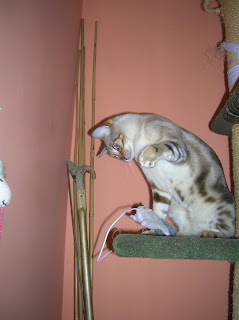You won't listen to me at midnight . . . you won't listen to me at three in the morning . . . you refuse to listen to my pleas as dawn breaks.
 Might you, I wonder, be very kind to your weary Mum and spare just a moment to read this heartfelt letter?
Might you, I wonder, be very kind to your weary Mum and spare just a moment to read this heartfelt letter?Yes, I know, I fully understand that you love your toys.
Thanks to your generous circle of friends, you've accumulated a wonderfully large family . . . toys that are much-chewed and much-cherished . . . believe me, I'm fond of them, too.
It's also true to say that, although I may be weary, no-one could call me curmudgeonly.
Never think that I don't understand your wish to play . . . I do.
I even have some sympathy for your hope that, with a little encouragement, you might get me to participate.

But there's something you need to know, Chloe . . . the early hours of the morning are NOT the time to wake your sleeping Mum and suggest she joins in a bit of fun!
Let's take the example of your much-loved mouse, your American mouse.
I know he's your very special friend and I'd be the last to deny his undoubted charms.
But do you really think that a squeaking mouse is the best thing to push under my sleeping chin in the early hours of the morning . . . or, come to that, a catnip hamster . . . or your favourite toy fish?
Whilst we're on the subject of what a Mum doesn't enjoy, have you ever asked yourself whether excited miaows are the most popular way to wake me up?
Or that sitting on the pillow and licking my nose will really give me zest for a midnight game?
 And believe you me, Chloe, a persistent paw poking down my neck will never tickle my sense of humour!
And believe you me, Chloe, a persistent paw poking down my neck will never tickle my sense of humour!All that being said, I fully agree that only a very skilful cat could climb your cat-tree, unhook your dangling squirrel, and bring him down to join in the fun.
But, come on now, do you honestly believe that the squirrel plays with any greater enthusiasm inside my bed than he would on the bedroom floor?
I can assure you that I don't!
Did you realise, Chloe, that, come dawn this morning, there were six of us struggling for space in my bed?
 Yes, I know. You had the greatest delight in returning after breakfast and finding all your toys still snuggled between the sheets.
Yes, I know. You had the greatest delight in returning after breakfast and finding all your toys still snuggled between the sheets. I'm sure they were as happy to see you as you were to see them, and I can't deny that the five of you constitute a very happy little family.
But, please, don't you think that, in future, you could all of you play your night-time games on the bedroom floor . . . and let me sleep in peace?
Just a hopeful plea from your very exhausted . . . but ever-loving,
Mum













